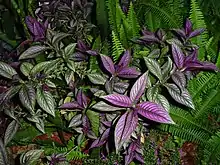| Strobilanthes dyeriana | |
|---|---|
 | |
| Scientific classification | |
| Kingdom: | Plantae |
| Clade: | Tracheophytes |
| Clade: | Angiosperms |
| Clade: | Eudicots |
| Clade: | Asterids |
| Order: | Lamiales |
| Family: | Acanthaceae |
| Genus: | Strobilanthes |
| Species: | S. dyeriana |
| Binomial name | |
| Strobilanthes dyeriana | |
Strobilanthes dyeriana, the Persian shield or royal purple plant,[1] is a species of flowering plant in the acanthus family Acanthaceae, native to Myanmar (formerly Burma).
Name
The Latin specific epithet dyeriana honours the English botanist Sir William Turner Thiselton-Dyer (1843-1928).[2]
Description
Growing to 1 m (3.3 ft) tall and broad, it is a tropical evergreen shrub, cultivated for its dark green foliage with bright, metallic-purple stripes radiating outward from the central leaf vein. In proper conditions, it will also produce pale purple flowers.
Cultivation
With a minimum temperature of 10 °C (50 °F), S. dyeriana grows best in USDA Zones 10–11.[3] In more temperate climates it is grown as a houseplant. It prefers a warm, humid position in good light. As the intense purple colour may fade with age, it is often treated as an annual.[3] In the UK it has gained the Royal Horticultural Society's Award of Garden Merit.[1][4] S. dyeriana is sold as a very common landscape plant due to its vibrant colors. In order to produce a high quality version of this plant, it is best to use a 200 mg*L-1*N from a complete fertilizer. [5]
References
- 1 2 "RHS Plant Selector - Strobilanthes dyeriana". Retrieved 5 March 2021.
- ↑ Harrison, Lorraine (2012). RHS Latin for Gardeners. United Kingdom: Mitchell Beazley. ISBN 978-1845337315.
- 1 2 "Persian shield: How To Grow & Care For Strobilanthes Dyeriana". Epic Gardening. Retrieved 28 November 2018.
- ↑ "AGM Plants - Ornamental" (PDF). Royal Horticultural Society. July 2017. p. 100. Retrieved 28 November 2018.
- ↑ Gamrod, Erin E., and Holly L. Scoggins. "Fertilizer Concentration Affects Growth and Foliar Elemental Concentration of Strobilanthes Dyerianus." HortScience, vol. 41, no. 1, 2006, pp. 231, http://hortsci.ashspublications.org/cgi/content/abstract/41/1/231.